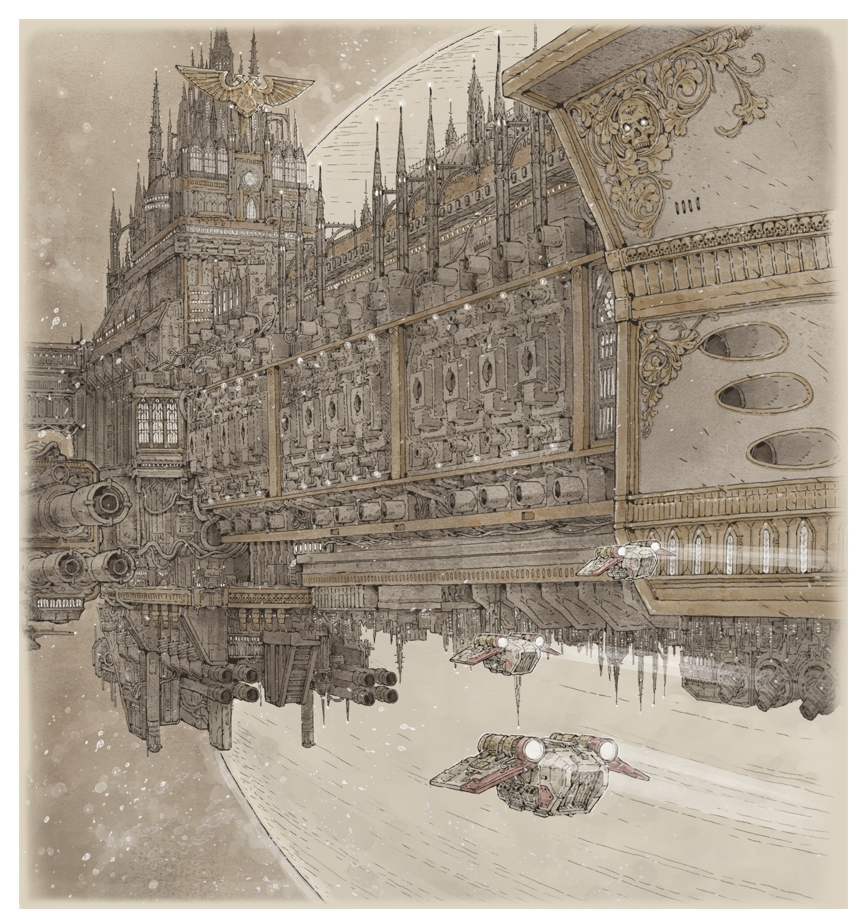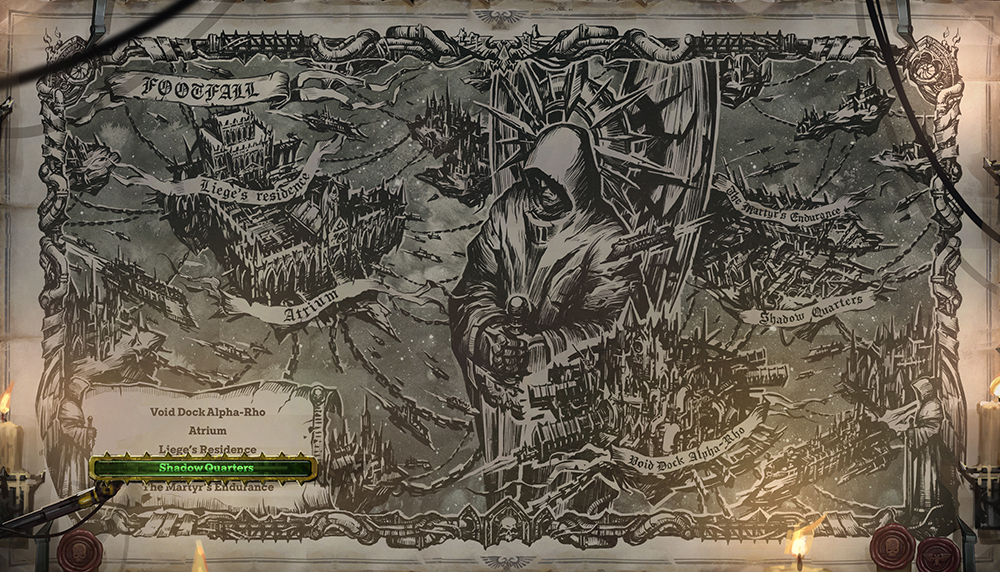Religion and Synthesizers
Every component of a game matters. An engaging story, believable and memorable characters, balanced gameplay, unique features, and an impressive visual aesthetic are all prominent aspects that grab players’ attention. However, there’s one more element that binds everything together and brings immersion to the next level. Music and sound design are one of our studio’s signature touches. Today we’re going to tell you a little about this process and all the creative and inventive ways our composers used sound and music to bring Warhammer 40,000: Rogue Trader to life. We now go over to
Paweł Perepelica
, one of the project’s composers and the writers of the game’s main theme.
The Main Theme
Every track of the game’s musical score was the result of long and meticulous work. Each theme went through a strict vetting process both at our studio and Games Workshop. It took us about five months to find the right sound for the main theme. The other composers and I tried many different versions, scrapping the ones we disliked, trying again and again. That search left me with some extra time on my hands, which I put to use getting started on the game’s space battle themes. One of those themes became a sudden hit and caught everyone’s attention, so much so that a decision was made to transform this track into the main theme.
As a long-time Warhammer fan, I’ve always wanted to work on something set in this universe. Imagine my excitement when I got the offer one day to work on Warhammer 40,000: Rogue Trader, finally having a chance to turn my ideas into reality! I always knew that if I were to write music for the Warhammer universe, I’d make sure to try and bring together two things: religion and synthesizers! Those two words are what come to mind when I imagine music from Warhammer 40,000.
The choir is the main theme’s centerpiece. For the orchestral version, we recorded a live professional choir. But here’s a fun fact: for the earlier version, I used my own voice layered on top of itself several times over. We needed the choir to sound natural and human, which you don’t always achieve with digital samples. That’s why in the beta, as well as in the version of this track shared earlier on YouTube, the vocals you hear are mine. A choir of Paweł Perepelica clones, if you will.
Vídeo do YouTube™: Main Theme | Warhammer 40,000: Rogue Trader
Visualizações: 127.941
You saw our heroes, our villains, and our setting. They fit perfectly into the universe we’ve created. But let us put our music to the test this time!
Vídeo do YouTube™: Main Theme - Live Choir | Warhammer 40,000: Rogue Trader
Visualizações: 31.410
Music is one of the key features that weave a captivating atmosphere. In a setting whose ambience has won the hearts of thousands, such details are especially important.
I used many vintage analogue synths from the 1980s during recording. They have a very unique sound, owing partly to the old hardware, a kind they don’t make anymore. One of those was the legendary Polivoks. Over the years, it’s been used by such famous artists as Rammstein, Goldfrapp, and Mick Gordon (who used it in the soundtrack to the 2016 reboot of Doom, among other things.)
Music for the Rogue Trader
The setting of Rogue Trader is somewhat unusual as Warhammer titles go. Back when we started working on the soundtrack, we had something more classical in mind, with more strings and other “organic” instruments. Then, however, we realised the music had to sound a little more “unpolished” and “rough.” Dramatic grandeur (provided by the choir, an organ, and other components typical of religious music) had to be complemented with something obscurely down-to-earth. That approach was received well by us, by Games Workshop, and, as we can see, by you, the audience.
We tried to preserve the grand atmosphere of Warhammer 40,000 that fans adore while also adding something new: that “unpolished” quality I mentioned along with some other unusual sounds. For example, our music is rich in various types of percussion. It has unexpected instruments along with some scraping and clanging. This is true of the entire soundtrack, not just the main theme. The music isn’t all about grandeur (which of course it can’t do without); there’s a more down-to-earth side to it as well. It’s likewise about a motley crew of characters who accompany the player throughout the entire game. It’s about the lives of lowly commoners. It’s about our voidship and the places it will take us to, the most fantastic and grim corners of the universe. And it’s about the enigmatic xenos.
We mixed and matched a lot, and used every means available to create a hybrid soundtrack. Aside from the choir, the synths, and classical strings, I used traditional instruments from a variety of cultures in a few tracks (such as a banjo, a hammered dulcimer, and a bouzouki). I processed them in order to give them a “broken” sound that’s evocative of a dieselpunk aesthetic. I experimented a lot with recordings of everyday objects around me, including coins, keys — and even a moonshine still!
There was even a bowed string instrument I crafted myself out of a tin can, a string, and a couple of wooden planks. We used that one a lot in the Footfall track.
Every World Sounds Different
We had a different approach for each of the settings, aiming for a soundtrack that players would instantly associate with whatever surroundings or situation they were in at any given moment. The game features a great variety of worlds and locations, and we used every possible artistic means to reflect how out of the ordinary they are — whether it be the voidship, Footfall, the alien jungle of Janus, or any of the other biomes and settings. Each of them is unique, with its own distinctness and charisma, which we sought to highlight through the music.
Metallic clangs were one of the soundtrack’s fundamentals (and every one of our guidelines said as much.) A technique I used often was impulse response reverb. In simple terms, I’d take the sound of something striking a metal pipe and blend it with the sound of a French horn. The result was a strange metallic sound that resembled singing (“singing pipes” was how I referred to it myself.) This effect appears most in tracks we hear when we’re on our voidship. The Rogue Trader’s ship is a hulking mass of metal which at the same time is practically a living being. We felt that its machinery had to have a peculiar singing voice of its own, and it would be great for the soundtrack to reflect that. In the name of the Omnissiah, obviously.
Footfall is a hub of sorts, full of people and bustle. Deals are constantly being brokered; schemes are being run. That’s why Footfall music contains, among other things, the sound of coins and the metallic noises of moving augmetics.
Janus is an entirely different place, a fascinating alien forest. I spent a long time finding a unique touch for this setting’s combat music. Normally, for a forest theme, the choice of instruments tends to be on the more classical, strings-and-winds side. Our forest isn’t typical at all. On top of being visually quite different from most of the game’s locations, I thought that adding a bit of contrast in the music would be awesome. Something organic but also unnatural, crossing a little into “electronica.”
I used a didgeridoo, an Aboriginal Australian wind instrument with a very peculiar sound. However, rather than to use it unaltered, I blended it with my own voice to make it sound like someone singing in a didgeridoo voice. Eventually, the team decided that the resulting sound carried the wrong associations when featured prominently in the tracks, seemingly echoing the culture of an indigenous tribe. But the sound did remain in the background, creating a strange sense of something DIFFERENT.
The Experiments Continue
Creating the Warhammer 40,000: Rogue Trader soundtrack has been a long process of searching, recording, and vetting. As is often the case, this type of work is an adventure, one where experimenting, failing, and starting again are all part of the process. Aside from the composers and the sound design team, the project’s creative team, its team of producers, and Games Workshop have also taken part in developing the music and sound design, each making their own contributions. On your journeys as a Rogue Trader across the vast number of the alien worlds, we hope you find them and their music as enjoyable and captivating as we did!








![The Year of Incline [2014] Codex 2014](/forums/smiles/campaign_tags/campaign_incline2014.png)


















![Glory to Codexia! [2012] Codex 2012](/forums/smiles/campaign_tags/campaign_slushfund2012.png)

















